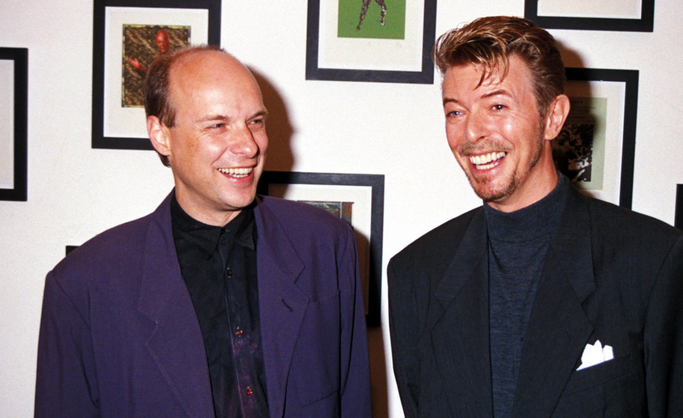It’s election year, and I’m sure we’re going to see some ostentatious victory stunts from the Lib Dems, in the past we’ve injected razzmatazz into politics by involving showbiz stars, drawing on our strong links with the entertainment world. This reached a zenith in 2010 when the likes of Colin Firth, JK Rowling, Armando Iannucci, Daniel Radcliffe and Professor Richard Dawkins were on a list of high profile backers published by the party. For many their enthusiasm cooled when we entered government, enacted gay marriage, brought UK aid to the UN level, raised the income tax threshold and brought in automatic pension enrolment. I thought I’d take a look at a few famous Lib Dem supporters, some of whom you’ll know all about, some you won’t.
Brian Eno
Brian Eno first came to prominence as keyboard player for Roxy Music, then invented ambient music, produced David Bowie’s best albums and went onto work with U2 and Coldplay. For my money he’s in the all-time top five list of best rock and pop producers alongside Norman Whitfield, Nile Rodgers, John Leckie and George Martin. Eno has worked within the Lib Dems from top to bottom, happily delivering Focus leaflets in his local ward and was appointed as a Youth Advisor on the first day of Nick Clegg’s leadership in 2007. In 2010 Eno contributed to a pre-election book Why Vote Liberal Democrat (which included input from an electric mix including former DPP Sir Ken MacDonald KC and ex Gurkha Madan Kumar Gurung).
Outside party politics Eno has been a longtime supporter of charity War Child, which has delivered humanitarian aid to war zones since the Bosnian war in 1993, and a dogged anti-censorship campaigner.



Brian Eno from the 1970s through to present day, an avant garde innovator and contributor to pop culture, and a champion for free expression and human rights
Barry Norman
Film critic Barry Norman appeared on our screens as a film critic for 26 years. Like many with a long term career at the BBC Norman was very discreet about his political affiliations but switched allegiance from the Labour Party to the SDP at the point of its foundation in 1981, and remained loyal after our merger in 1988. He explained that Shirley Williams was his favourite politician. Aside from culture, Norman had a great interest in current affairs and technology, presenting Radio 4’s Today programme in the 1970s and The Chip Shop, a programme about home computers in the early 1980s.
Norman would weave references to cricket into his Film shows at every available opportunity and spent much of his free time watching games at Lord’s – my kind of guy.

Ludovic Kennedy
Always a deep thinker, Kennedy had a brief foray into representative politics as Liberal candidate for Rochdale, first at a by election in 1957, then the general election in 1959, he didn’t succeed but increased the Liberal vote share and joined an illustrious list of notable figures to stand and fail to get elected for us that includes the likes of CB Fry. Kennedy was a broadcaster and author and got involved in a wide range of campaigns during his life, such as opposition to the death penalty and later in life voluntary euthanasia. Kennedy wrote several books about miscarriages of justice, the most famous being The Airman and The Carpenter, in which he contended that Richard Hauptmann did not kidnap and murder Charles Lindbergh’s baby, a crime for which he was executed in 1936. The book was made into a 1996 HBO film Crime of the Century, starring Stephen Rea and Isabella Rossellini.
Kennedy felt so strongly about voluntary euthanasia he resigned from the Lib Dems as Charles Kennedy was reluctant to adopt the policy, he stood as an independent Devizes in 2001, got 2% of the vote and subsequently rejoined the party.

Helena Bonham-Carter
The Bonham-Carter family has been associated with Liberal politics since John Bonham-Carter became a Whig MP in 1816. Other major figures in the dynasty include Violet, daughter of H.H. Asquith and president of the party 1945-47 (known as an opponent of appeasement and supporter of family allowances), and her son Mark, victor in the 1958 Torrington by election, a landmark moment in the party’s post war revival (known as the first chairman of the Race Relations Board and a campaigner for granting British citizenship to ethnic minorities in Hong Kong). Mark is Helena’s uncle, throughout her career Helena has been tight-lipped about her political connections, perhaps not wanting to be defined by her family history but sometimes you can’t shake us Liberals off. Apart from roles in Howard’s End, Harry Potter, Alice in Wonderland, Helena is also known for sharing a school stage with Nick Clegg at Westminster in the Jacobean play called The Changeling. At one stage, she had to kick Clegg between the legs, making him collapse in agony.
‘We got it down to a fairly fine art of her missing the crown jewels, so to speak,’ Clegg recalled in an interview with the Mail, ‘But, once, she got it spot-on, and no acting was required.’
While Helena is busy acting let me assure that the Bonham-Carter political dynasty lives on, Jane Bonham-Carter is Baroness of Yarnbury, who is, fittingly enough, Lib Dem spokesperson for Culture in the House of Lords.
